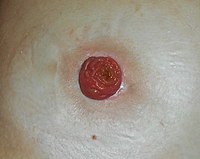
Photo from wikipedia
Background This study aimed to investigate factors associated with the development of ileostomy complications in rectal cancer patients, including those who received neoadjuvant treatment. Methods This retrospective trial included 133… Click to show full abstract
Background This study aimed to investigate factors associated with the development of ileostomy complications in rectal cancer patients, including those who received neoadjuvant treatment. Methods This retrospective trial included 133 consecutive patients who underwent surgery for rectal cancer with temporary diverting ileostomy. Patients' demographic characteristics as well as the pre- and postclosure outcomes and complications were analyzed. Results In logistic regression analysis, longer duration of ileostomy emerged as a significant independent predictor of any complication during ileostomy. The respective odds ratios for 3–6 months and >6 months vs. <3 months of ileostomy duration were as follows: OR, 4.5 (95% CI, 1.2–16.7), p=0.023; and OR, 15.2 (95% CI, 3.1–75.2), p=0.001. An additional stepwise model also identified hypertension as a significant predictor. In stepwise logistic regression model, adjuvant chemoradiotherapy emerged as significant independent predictor of “any ileostomy-related complication after ileostomy closure”: OR, 4.5 (2.0–10.2), p < 0.001. Conclusion Duration of ileostomy appears to be the main determinant of ileostomy-related complications. Patients who had received neoadjuvant or adjuvant therapy had longer ileostomy duration, which may be attributed to the concerns of the surgeon or to the complications themselves.
Journal Title: Journal of Oncology
Year Published: 2020
Link to full text (if available)
Share on Social Media: Sign Up to like & get
recommendations!